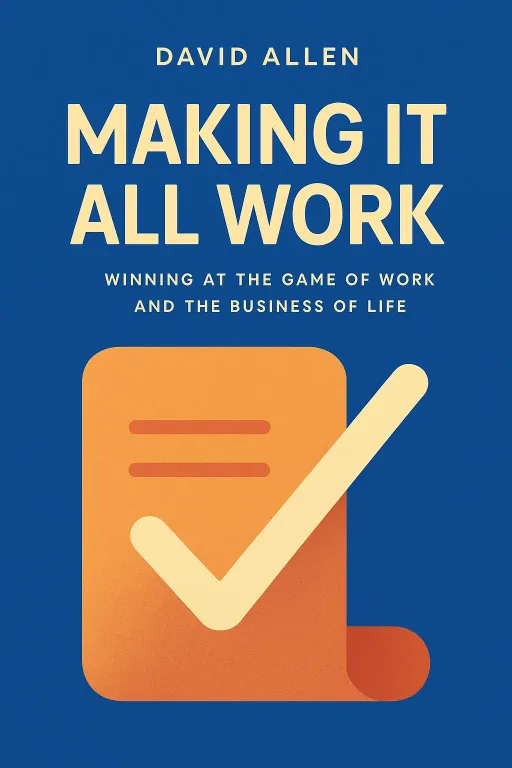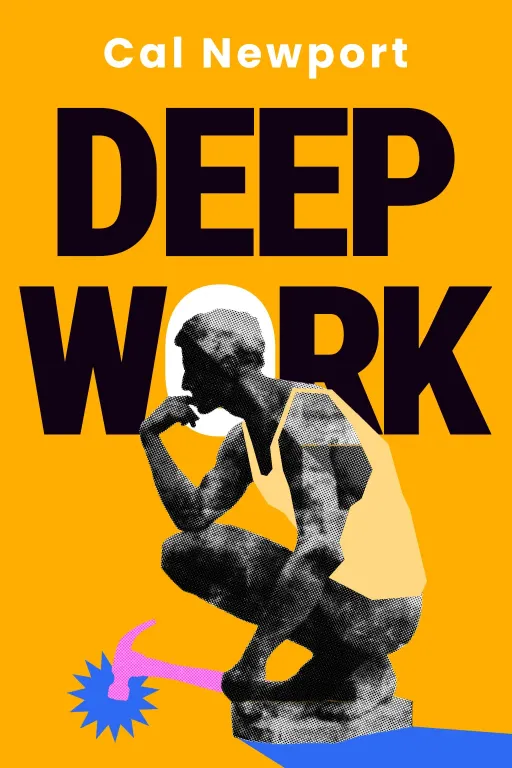
The Captain & The Crazy Maker
10 minWinning at the Game of Work and the Business of Life
Golden Hook & Introduction
SECTION
Mark: Okay, Michelle. You get five words to review David Allen's Making It All Work. Go. Michelle: My brain needs an upgrade. Mark: Ha! Perfect. Mine is: "Control and perspective create freedom." Michelle: Wow, okay. One of us is clearly more optimistic than the other. Freedom sounds nice, but an upgrade sounds necessary. Mark: Well, that's exactly the territory we're exploring today with Making It All Work: Winning at the Game of Work and the Business of Life by David Allen. For anyone who's heard of his first blockbuster book, Getting Things Done, this is the deep-dive sequel. Michelle: The legendary GTD. The system that launched a thousand productivity apps and, let's be honest, a thousand half-finished to-do lists for most of us. Mark: Exactly. And David Allen is such a fascinating figure. Before he became this global productivity guru, he claims to have had 35 different professions by the time he was 35. Michelle: Wait, thirty-five? That’s not a career path, that’s a career explosion. So he’s not some academic in an ivory tower. He's been in the messy, real-world trenches. Mark: Completely. And that experience is baked into this system. It’s not about abstract theory; it’s about what actually works when life is chaotic. The book itself has a pretty dedicated following, though some readers find it a bit dense. I think that's because it’s not just a set of tips; it’s a whole new way of thinking about thinking. Michelle: A new way of thinking. Okay, I’m intrigued. Where do we even start with a book that promises to make it all work? That’s a big promise.
The Matrix of Self-Management: Moving Beyond Just 'Getting Things Done'
SECTION
Mark: It is a huge promise, and he delivers a surprisingly simple, but profound, model to diagnose why it often doesn't all work. He argues that our effectiveness lives on a matrix with two axes. On the horizontal, you have Control—how well you're managing your day-to-day stuff. On the vertical, you have Perspective—how clear you are on your bigger-picture goals and values. Michelle: Okay, a matrix. Control and Perspective. So it’s not just about checking off boxes. Mark: Precisely. And where you land on that matrix defines your productivity personality. He lays out four types, and I think everyone will recognize themselves in at least one of them. First, down in the bottom-left, with low control and low perspective, you have the Victim or the Responder. Michelle: Oof. That sounds grim. Mark: It’s that feeling of being completely overwhelmed, just reacting to whatever is loudest and latest. Allen tells this great little story of someone trying to host a dinner party. You start by burning the sauce. Then you realize you forgot a key ingredient. As you’re frantically chopping a replacement, you cut your finger. And just as you’re bleeding into the onions, you hear the doorbell ring, and you realize you haven’t even showered. That panic? That’s the Victim quadrant. Michelle: Oh, I have absolutely been the 'Dinner Party Disaster' host. That is a painfully real feeling. What’s the next one? Mark: If you slide over to high control but still have low perspective, you get the Micromanager or the Implementer. This is the person who is incredibly organized, but about the wrong things. Allen gives the example of an employee who spends all day creating a hyper-detailed, color-coded system for replenishing the office paper clips, all while ignoring the major project deadline that’s about to explode. Michelle: They’re busy, but they’re not productive. They’re organizing the deck chairs on the Titanic. Mark: A perfect analogy. Then, if you flip that, you get low control but high perspective. This is the Crazy Maker or the Visionary. This is the person with a million brilliant ideas. Their office is a blizzard of sticky notes, their whiteboard is a masterpiece of brainstorming, but nothing ever gets done. They have the vision, but no traction. Allen actually admits this is his natural tendency—he calls it "Bright Bauble Syndrome," where he's constantly distracted by the next shiny idea. Michelle: That sounds like every creative person I've ever met. A genius with a hundred unfinished novels. Okay, so that leaves the top-right corner. The promised land. Mark: The promised land. High control and high perspective. He calls this the Captain and Commander. This is that state of flow where you’re not just busy, and you’re not just dreaming. You’re confidently engaged in what you’re doing, because you have a system you trust to handle all your other commitments, and you have the clarity to know that what you’re working on right now is the right thing to be working on. Michelle: Wow. The Captain and Commander. It sounds amazing, but it also sounds like a mythical creature, like a unicorn. How does anyone actually get there? It feels like you’d need a second brain to manage all of that.
The Mental Game: Why Your Brain is a 'Terrible Master'
SECTION
Mark: That’s the million-dollar question, and your phrasing is perfect. The secret to becoming a Captain and Commander is realizing you do need a second brain. The core of Allen's philosophy is that we've been using our primary brain for the wrong job. He says the mind is a great servant, but a terrible master. Michelle: What does he mean by that? A terrible master? Mark: He uses this brilliant, simple story to explain it. Think about a flashlight in your house that has dead batteries. When does your brain remind you, "Hey, you need to buy batteries"? Michelle: When I pick up the flashlight during a power outage and it doesn't work. Or maybe when I walk past the flashlight in the drawer. Basically, only when it's completely useless to be reminded. Mark: Exactly! Your brain never reminds you when you're standing in the battery aisle at the store. It’s a terrible office assistant. It nags you with the right information at the wrong time. He argues our brain’s short-term memory—what he calls our psychic RAM—is designed for in-the-moment problem-solving, not for being a storage warehouse of every single thing we "should," "could," or "ought to" do. Michelle: So every time I’m trying to focus on a report, and my brain pops up with "Don't forget to email Susan," and "You need to schedule a dentist appointment," and "What are we doing for dinner Thursday?"—that’s my psychic RAM getting overloaded? Mark: That’s it precisely. Each one of those things is what he calls an "open loop"—an unfulfilled commitment that your brain is trying to hold on to. And it can’t hold very many before it starts to glitch, creating that constant, low-grade anxiety and distraction that is the soundtrack to modern life. The system isn't about becoming a hyper-organized robot. It’s about getting those open loops out of your head and into a trusted external system. Michelle: Okay, that is a huge 'aha' moment for me. I always thought GTD was for naturally organized people who love making lists. But you're saying it's actually for the rest of us—the creative, chaotic, 'Crazy Maker' types whose brains are just not built for this. Mark: One hundred percent. The goal is to achieve what he calls "mind like water," a concept he borrows from martial arts. Water responds to a pebble thrown into it perfectly—with the exact right amount of force—and then returns to calm. It doesn't overreact or underreact. You can only achieve that mental state when your mind is clear, not when it's trying to remember to buy batteries. Michelle: Mind like water. I love that. It reframes the whole process. The point of capturing everything isn't to be a control freak; it's to stop your brain from being that terrible, nagging assistant so you can finally think clearly. Mark: You’ve got it. It’s about giving your brain a promotion. Stop making it do administrative work and let it do what it was designed for: having ideas, making connections, and being fully present. Michelle: This is why some readers probably find the system so demanding. If you just see it as a set of rules for making lists, it feels like a chore. But if you see it as a way to fundamentally offload your mental operating system, it feels like a liberation. Mark: That’s the key. It’s a practice, not a project. And it starts with one simple, but powerful, first step. Michelle: Okay, so what is it? What's the first, simplest thing someone can do to start getting control without having to build this massive, color-coded, paper-clip-tracking system? Mark: It’s a process he calls the Mind Sweep. You take a pen and a stack of paper, or open a blank document, and for 15 to 30 minutes, you write down every single thing that has your attention. Absolutely everything. Big, small, personal, professional. "Fix leaky faucet." "Launch new product line." "Call Mom." "Figure out life purpose." "Buy dog food." You get it all out. Michelle: Just dump it all out of your head onto the page. No organizing, no prioritizing, just capturing. Mark: Just capturing. Because the first step to quieting that nagging voice in your head is to prove to it that you’re listening. You’re acknowledging every single open loop. That act alone can create an incredible sense of relief and clarity.
Synthesis & Takeaways
SECTION
Michelle: That really connects everything. The Matrix of Self-Management he talks about—the Victim, the Micromanager, the Crazy Maker—it’s not a life sentence. It’s a diagnosis of where your system is breaking down. Mark: Exactly. The matrix shows us where we are, and understanding the mental game tells us why we're stuck there. If you’re a Crazy Maker, it’s because you have all these brilliant ideas, but they’re stuck in your head, creating chaos instead of progress. If you’re a Victim, it’s because so many things are hitting you that your internal system has crashed. Michelle: So the whole system, at its heart, is about building an external brain. It’s not about becoming a robot; it’s about building a trusted system so your real brain can finally be free to do what it’s actually good at—having ideas, not just holding them. Mark: That is the core insight. "Your mind is for having ideas, not holding them." If people take away one thing from David Allen, it should be that. Michelle: I love that. So the challenge for everyone listening is to just take five minutes after this. Seriously, pause the podcast. Grab a piece of paper or open a notes app, and do a mini 'Mind Sweep.' Write down everything that's nagging you, big or small, without judgment. Mark: It’s a powerful exercise. And we'd love to hear how it feels. Find us on our socials and tell us the weirdest or most surprising thing that came up during your mind sweep. You’ll be amazed at what’s been hiding in there, draining your energy. Michelle: This is Aibrary, signing off.









